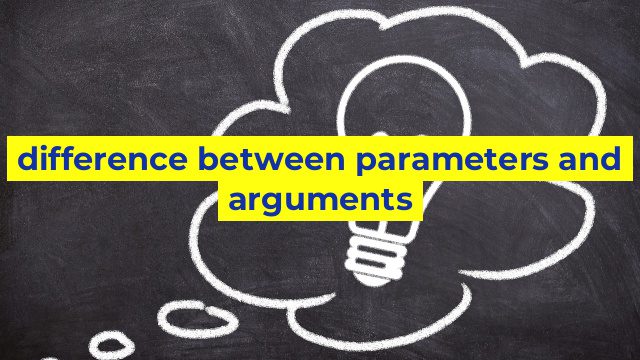Difference Between Parameters and Arguments in Programming
When it comes to programming, the terms “parameters” and “arguments” are often used interchangeably, leading to confusion for beginners. However, these two terms have distinct meanings and should not be mixed up. Here’s what you need to know:
What Are Parameters?
In programming, a parameter is a variable that is declared inside a function definition. It is a placeholder that can receive a value when the function is called. The main purpose of parameters is to enable modular programming, where chunks of code can be reused in different parts of a program.
For example, consider the following function that calculates the sum of two numbers:
function sum(a, b){
return a + b;
}
Here, “a” and “b” are parameters of the “sum” function. They act as placeholders for the values that will be passed into the function when it is called.
What Are Arguments?
On the other hand, arguments are the actual values that are passed to a function when it is called. They are the inputs that are used by the function to perform its task.
Using the same example as before, let’s call the “sum” function with the arguments 2 and 3:
var result = sum(2, 3);
console.log(result); // outputs 5
Here, 2 and 3 are the arguments passed to the “sum” function. When the function is executed, it receives these arguments and uses them to perform the addition operation.
Key Differences Between Parameters and Arguments
To summarize, here are the key differences between parameters and arguments:
– Parameters are declared in the function signature, whereas arguments are passed to a function during the function call.
– Parameters act as placeholders that can be assigned values when the function is called, whereas arguments are the actual values that are passed to a function.
– Parameters enable modular programming and make functions reusable. Arguments provide the necessary input for functions to perform their task.
In conclusion, understanding the difference between parameters and arguments is crucial for proper function execution and modular programming. By keeping these concepts clear, you’ll be able to write more efficient and effective code.
Table difference between parameters and arguments
| Parameter | Argument |
|---|---|
| Defined in a function signature as a placeholder for an input value | The actual value passed to a function when it is called |
| Prepares a function to receive input | Is the input that is passed into a function to be processed |
| Can be defined with a default value | Should be passed a value when invoking a function |
| Can be optional or required | Is always required in function calls |
